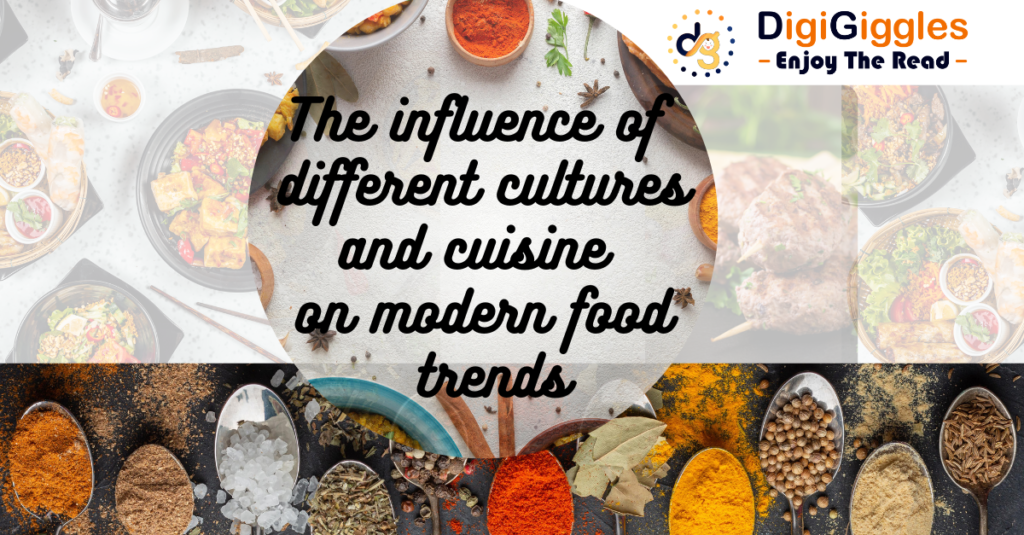Introduction
Food is an important component of human civilization, and it has always been influenced by the world’s cultural diversity. Different cuisines and cultures are blending as a result of globalization and the dissemination of information, resulting in a fusion of flavors and new food trends. In this blog, we will look at how diverse cultures and cuisines have inspired modern culinary trends.
Culture’s influence on Food Trends
Culture has a significant impact on food trends, and it is not restricted to how people prepare and consume. Culture influences the ingredients, flavors, and even the presentation of cuisine. For example, Indian cuisine is known for its varied use of spices, whereas Chinese cuisine is known for its stir-fried meals. The influence of culture can be seen in eating choices of people and the growth of modern cuisine trends.
The advent of fusion cuisine is an outstanding example of how culture influences food trends. Fusion cuisine is the blending of two or more diverse cuisines to create a new and distinct gastronomic experience. For example, combining Japanese sushi with Mexican salsa results in a fusion cuisine known as “sushi burrito.” It’s a prime illustration of how cultures collide to produce new eating trends.
Influence of Asian Cuisine
Asian cuisine has had a big influence on modern food trends, with dishes like sushi, ramen, and pho becoming famous worldwide. Herbs and spices used in Asian cuisine have also influenced how we taste our meals today. The umami flavor, which is common in Asian dishes, has become a food industry buzzword, with many chefs infusing it into their meals. Asian cuisine has also introduced the globe to the concept of street food, which has now become a trend in many places.
Influence of European Cuisine
European cuisine has also had a big impact on modern culinary trends. The French pioneered exquisite dining, which has now spread around the world. The concept of combining wine with food is likewise a French creation that has gained worldwide popularity. Italian cuisine has also had a big impact on modern culinary trends, with meals like pizza and pasta popular all over the world. Many chefs around the world have adopted the use of fresh ingredients and simple cooking techniques.
Influence of Middle Eastern Cuisine
Middle Eastern cuisine has had a considerable influence on modern food trends, with dishes like hummus, falafel, and kebabs becoming famous around the world. Spices and herbs like cumin, coriander, and mint have also influenced how we flavor our cuisine. Many countries have adopted the mezze concept, which entails sharing small dishes of food.
Influence of African Cuisine
African cuisine has always been underrepresented in the global food scene, but this is changing. African flavors and ingredients such as berbere spice, harissa, and yams are becoming increasingly popular. West African cuisine, which includes delicacies like jollof rice and egusi soup, has also gained popularity. Plantains and cassava are also becoming more popular in cuisines.
Influence of Latin American Cuisine
In recent years, Latin American food has grown in popularity, with dishes such as ceviche, empanadas, and tacos becoming popular. Ingredients like chili peppers, corn, and beans have also influenced how we flavor our food. Street cuisine, which is famous in many Latin American nations, has also gained popularity in many places throughout the world.
Impact of globalization on food trends
Globalization has had a significant impact on modern cuisine trends. Chefs may experiment with diverse flavors and cuisines because of the availability of ingredients from all over the world. As a result, fusion cuisine has grown in popularity, and numerous new food trends have evolved.
The rise of street food is one of the most significant effects of globalization on food trends. Street food is frequently inspired by local cuisine and is an inexpensive and accessible way to sample flavors from around the world. It has become a worldwide fad, even making its way into high-end eateries.
Another globalization-related development is the rise in popularity of plant-based diets. Plant-based diets are becoming increasingly popular as people grow more health-conscious and environmentally conscious. It is a trend that is not limited to one culture or cuisine, but has achieved global traction.
Conclusion
Thus, food trends are continuously changing, and culture and globalization have an important part in shaping them. The influence of many cultures and cuisines on modern food trends is clear, from fusion cuisine to plant-based diets. We should expect to see more culinary trends emerge in the future as the world becomes more connected. We should expect even more intriguing and unusual culinary experiences as individuals continue to experiment with other flavors and cultures.
